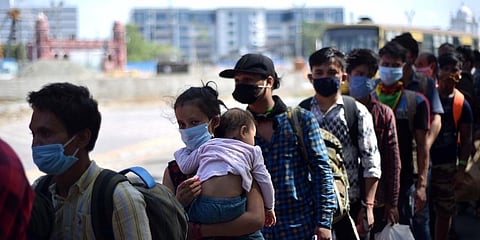Insensitivity towards deaths of migrant workers
It is insensitive, to say the least, for the Union government to refuse to compensate migrant families who lost their near and dear ones making the trek back home. The government’s stand is based on the specious argument that there is no data available. “No such data is maintained.
Question does not arise in view of the above,” was the curt reply of Union Labour Minister Santosh Kumar Gangwar to questions from opposition benches. In the first Parliament session after the pandemic broke out in March, the labour ministry was asked: one, did the government have any data on migrant workers who had returned home? And two, were the names of those who had lost their lives documented?
More than a crore of migrants, a figure acknowledged by the government, had made their way back to their villages after lockdown conditions paralysed their sources of income.
Most went hungry and thirsty; many lost their lives. The callous reply by the labour ministry is prima facie a breach of the apex court order of June 9 that had directed both the Centre and states to identify and transport migrant workers home within the next 15 days. If the registration process and transportation of migrants had been carried out as envisaged by the court, the basic database would have been available.
If the government is willing to look beyond its nose, there is volumes of private NGO data documenting the tragedy. For instance, the SaveLIFE Foundation, a road safety NGO, has documented that 198 migrant workers lost their lives in as many as 1,461 road accidents during the lockdown period till May 31. The labour ministry could have built up primary data too by inviting claims of deaths during those gruelling summer months.
It is indeed bizarre that the Delhi Police, a Central government agency, has collected 11 lakh pages of data to confront arrested anti-CAA protestor Umar Khalid to establish a conspiracy, but has no data on those who died while on the move. Have the lives of those who toil and die by the wayside become so cheap?

